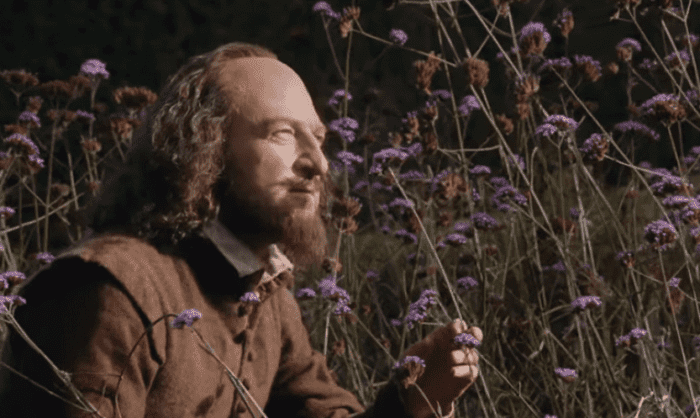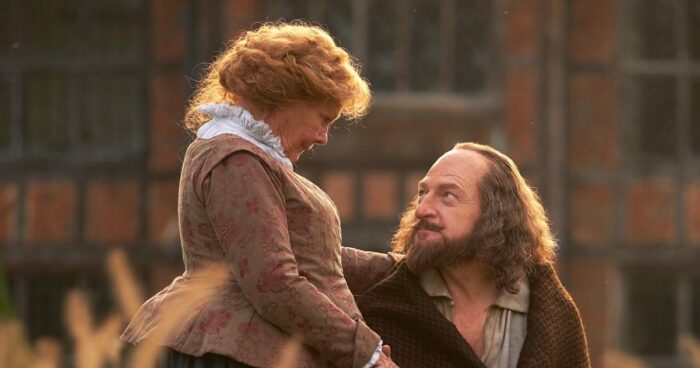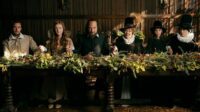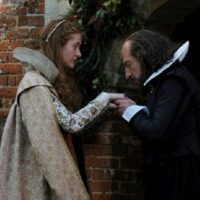One cold and quiet afternoon at the tail end of the 2013-2014 Christmas season, as my partner and I were leaving Hall’s Croft in Stratford-upon-Avon, our tour guide engaged us in idle chit-chat about our whirlwind thirty six-hour stay in her town. We told her we were heading north to Liverpool the next morning, and she gave us a few restaurant recommendations for that evening to cap off our visit. Holiday pleasantries in a Tudor doorway.
Suddenly she stopped. “Have you been to the church yet?”
We checked the time; it was a short walk around the corner from Hall’s Croft to Holy Trinity Church, where William Shakespeare lays interred beneath the famously elementary graveside curse. It was to be our last stop on our pilgrimage that day, so we nodded a hesitant affirmation, hoping we had time to get there.
I’ll never forget what she did next. Standing there next to us—she in her Puritan garb, a white cap on her head, hands clasped in front of her apron, with an accent as thick as the Forest of Arden—she lowered her voice and smiled at us through her eyes. “He’s there, you know,” she whispered. “Straight on through to the back…”
As I sat down in the theatre to watch Kenneth Branagh’s All is True—a loose imagining of what Shakespeare’s retirement years must have been like following his return to Stratford in 1613, after his beloved Globe Theatre was burnt to the ground during a staging of Henry VIII, alternately titled All Is True, which is where the name of the film comes from (ta-da!)—I had the same chills rolling up and down my spine. Seeing the famous Chandos portrait of Shakespeare onscreen and knowing that in a moment we were going to be seeing the inimitable Kenneth Branagh bring the Bard to glorious life once again… it was a thrilling moment. I may have even clapped.
He’s there, you know… right up there on the screen.

I am an ardent fan of William Shakespeare. I adapted Romeo & Juliet for a modern audience (aka my junior high school classmates) around the same time Baz Lurhman did (only difference is he got Dicaprio… and, well, my production never made it past rehearsals) and now, in a nice bit of circular storytelling, I get to teach Shakespeare to junior high school students, who adapt Romeo & Juliet for modern audiences in assignments I give them. I’m a Stratfordian—I believe that the man from Stratford and the author of the plays attributed to William Shakespeare are one and the same. My partner and I turned our Twin Peaks podcast into a Shakespeare podcast earlier this year, and we’re winding our way through the Collected Works as we speak. I consider myself an amateur scholar, and I freely acknowledge that Shakespearean scholarship is problematic for a number of reasons, not least of which is the fact that very, very, astonishingly little is known about his life.
The question that inevitably haunts this film is therefore quite simple: How can anyone purport to tell the story of any part of William Shakespeare’s life, let alone a story with the title All is True?
Many have tried. And the tales they tell usually take the form of fanciful imaginings that often say more about the person doing the writing than anything else—Shakespeare in Love is staunchly heteroromantic, painting Shakespeare as a twitterpated young man suffering from writer’s block; 2011’s Anonymous posits that Shakespeare was bawdy and uncouth and not even the real writer of the plays; and Ben Elton’s Upstart Crow, a BBC comedy series, shows him as bumbling and clueless, played to great effect by David Mitchell (Elton, curiously enough, was also the writer of All is True).
But in the hands of Kenneth Branagh, a man best known for a series of sweeping and grand Shakespearean adaptations in the 1990s (including Henry V, Hamlet, and Much Ado About Nothing), I expected that this would be a similarly sweeping and grand film; a swan song, if you will. And in many respects I was not disappointed. The film is beautifully filmed, showing Stratford-upon-Avon and the Warwickshire countryside absolutely resplendent in shades of what seems to be a perennial autumn; fitting, I suppose, as a technique to remind us that the main character is in his own golden years, though the film takes great pains to tell us that at every turn as well so the visual imagery is a tad unnecessary. Still: very beautiful.
It’s also tremendously well-acted—no surprises here. Kenneth Branagh’s Shakespeare is dry and resigned but retains the spark of wit that marked him off as the great writer of yore. Judi Dench, as Shakespeare’s wife Anne, is similarly captivating as she gets reacquainted with this stranger of a man, now returned home for good after twenty years in London; her struggle to relate to her husband and keep the peace between him and his daughters while also coming to grips with her own legacy as the illiterate wife of the greatest writer in the world is compelling. Ian McKellan is obviously having a great deal of fun playing the flamboyant and foppish Henry Wriothesley, 3rd Earl of Southampton, who was both the recipient and subject of several of Shakespeare’s poems and sonnets; the film tackles the question of “Was Shakespeare in love with Southampton?” fairly directly (as far as Shakespeare biopics go) and the scene in which the two men chat beside a late-night fire, while likely entirely fictional, is truly lovely, so all is forgiven.

But while the film is certainly enjoyable, it falls off the rails for me in the stories it’s trying to tell.
First, there’s the surface story. This is of a man returning home to a family he hardly knows and coming to grips with his legacy, which is in question owing to the fact that his only son, Hamnet, has been dead for seventeen years, and of his two surviving daughters, he has only one granddaughter. Patrilineal descent being the only thing of import for so much of Western history, Shakespeare struggles with what he’s leaving behind, believing (ironically) that it won’t be his name.
It may be true that the loss of his son still weighed on Shakespeare’s mind as he left London for good in the summer of 1613. When he adapted the Scandinavian legend of Amleth into Hamlet, Prince of Denmark in the few years following Hamnet’s death—with the name of his son being one letter off from the name of his (arguably greatest) tragic hero—it’s hard to imagine it not being at the forefront of his mind. And it is entirely possible that he was haunted by the loss; he was on his way home from London when Hamnet took ill, and owing to it being a plague death, the whole thing was taken care of with such swiftness that he even missed the funeral despite the distance from London to Stratford being (at that time) only a few days. Did he see his son’s ghost along the way, as suggested in All is True? Was Hamnet the inspiration behind all of Shakespeare’s writing, before and after his death? Who knows. I don’t take serious umbrage with this particular interpretation of Shakespeare’s sudden disappearance from the London theatre scene. It’s as good an explanation as any.
But what I do find troubling is that the film attempts to tell this story while simultaneously telling another one in parallel: of one daughter in an unhappy Puritanical marriage and of another turned bitter spinster, and of a father coming to understand something deeper about the role of the women in his life. This, arguably, is the better story; it’s more timely, certainly, and could be borne out by an interpretation of Shakespeare’s later female protagonists, who were strong-willed, openly defiant of their fathers, but loved and cherished all the same (lookin’ at you, Miranda!). The film tricks you into believing that you’ll go there, but at the last minute a strange curveball is thrown into the works and we’re back to Shakespeare agonizing over Hamnet’s death once again at the expense of any meaningful on-screen relationship with his daughters, which had—only moments before—been shining in their renewal.
It left me wondering what the film was trying to say about legacies, about inheritance. His brilliant daughters are alive and vibrant; his son is dead and gone. He’s had misconceptions about them all. In the end, his daughters and wife learn to read and write; they eulogize him with his own words, from the funeral scene in Cymbeline. It’s poignant and beautiful, but the hundred or so minutes of the film before this moment shoved these women to the side in favour of the fictional idea of a son that Shakespeare clung to until almost the very end of his life. It’s quite sad, when you think about it, especially considering it’s based on nothing more than interpretations; this was a conscious choice on the part of the writers, not the result of scads of irrefutable documentation. It could have so easily been a choice to talk seriously about the role of women in Shakespeare’s life, instead of just alluding to it.
(There is also no truly earned reconciliation between Will and Anne Shakespeare, which is hard to understand given the great actors embodying the roles here. Anne’s final scenes are touching, but they’re not the result of anything other than her own desire to please her husband and live up to his greatness, which is a thing, I guess, but it’s hardly satisfying.)
Apart from the literal story being told, there’s the figurative one too, which is that Shakespeare Was The Greatest Ever and Here Are All the Many Reasons Why. Now, Shakespeare biographies have always tended toward the hagiographic, which is hardly surprising for a culture that teaches its children that Shakespeare is the best writer bar none. Deifying Shakespeare is not a crime; I’m not suggesting that at all. But the sheer volume of moments in All is True when people commented on how amazing Shakespeare was—youths barging in on him planting his hollyhocks to ask him why he’s so freakin’ amazing; his neighbours treating him like a mythical legend; friends rocking up at his house to tell him that he’s a genius and a conquering hero; even Shakespeare himself commenting on his own greatness to admonish his ill-treatment by his family—it all seems to me to be a lot of sunshine-blowing. Because the facts of the matter are that other, lesser poets died in the same year as William Shakespeare did and were given laudatory internments in Westminster Abbey; Shakespeare’s death on his birthday—April 23, 1616—warranted very little fanfare.
That isn’t to say that it didn’t happen, or that it couldn’t have happened—Shakespeare was a dramatist, and plays were still considered pretty lowly entertainment compared to lofty poems, especially heading into the Puritanical middle part of the 17th century—but it stretches credulity and feels a little too much like the filmmakers winking at the audience, trying to get us to buy into the myth of Shakespeare’s greatness all over again by having every other character listing off his accomplishments and accolades one by one. The facts of the matter are that Shakespeare died quietly and in relative obscurity, and that should be okay. I wish that had been the story All is True told. Ordinary people who tend gardens can also pen the greatest body of work in the English language. We should celebrate that.
I wanted to love this film, and I didn’t hate it, but it wasn’t what I wanted to see. My partner and I jokingly called it “Shakespeare fanfic”, not because we don’t appreciate fanfic (we do! we write it!) but because we knew that it would contain elements of wish fulfilment elevated above what was likeliest to have happened. But even with that assumption, there were things that disappointed us.
On top of it all, I’m still not entirely sure who this film is for. There was a sizeable crowd of moviegoers at the screening we went to at a small art house theatre frequented predominantly by university students and academics alike. During the post-script, when it was mentioned that Shakespeare left Anne his “second best bed” in his will, there was a lot of murmured “Aahhh”-ing going on; that must mean that an earlier scene, in which Shakespeare consults with his lawyer about amending his will to leave his wife a special piece of furniture, went entirely over their heads. What else did they miss? The subtext of the possible romantic relationship between Shakespeare and Southampton? The rushed-through scenes of Susannah’s adultery trial or Judith’s wedding to Thomas Quiney? The reference to Shakespeare poaching deer on Sir Thomas Lucy’s property at Charlecote as a young man? These aren’t super obscure anecdotes culled from the meagre details of the man’s life, but people didn’t seem to recognize them all the same. How successful can a film be if these details, crammed into fast-paced scenes and delivered in almost throwaway lines, aren’t grasped by the audience?
But that is really okay. If the only people to get pleasure from this film are Kenneth Branagh and Ben Elton, that’s wonderful. I think a lot of people will love All is True, in spite or because of the things I mentioned above. I still applaud this film nonetheless. I still love Shakespeare. I still love Kenneth Branagh. I still get chills when I think about certain scenes, certain lines, in much the same way as when I remember my visit to the poet’s grave in his hometown. I still love and am guilty of mythmaking, of filling in the gaps in the actual record to explain the mysteries of Shakespeare’s life and works.
If you are like me in any of these respects, you should definitely check out All is True. And even if you’re not… maybe it’s still worth a shot.





